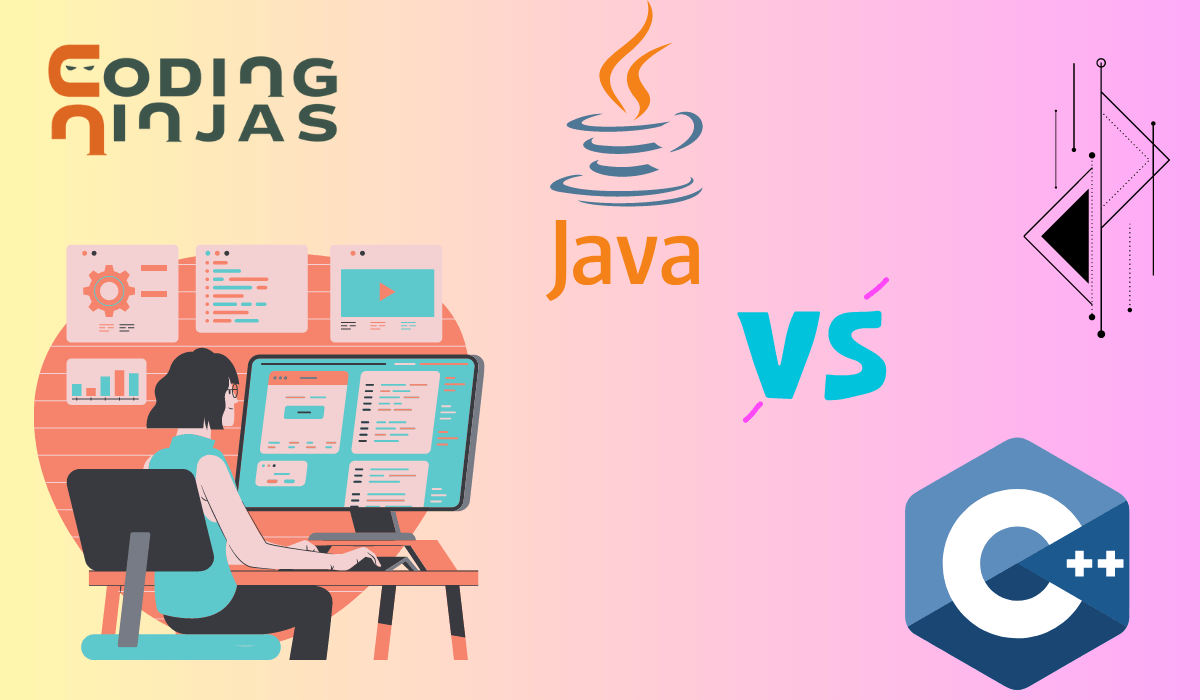Introduction
C++ is known for high-performance and system-level programming, offering low-level control but increased complexity. Java prioritizes portability and security, making it ideal for web, mobile, and enterprise applications.
The general preference for using either C++ or Java highly depends on the requirement. While C++ is much better for networking or hardware-related tasks, Java is portable and versatile. Java programs can easily be migrated and run elsewhere while it has a massive number of developers proficient in this language.

In this article, we will discuss C++ and Java or the Differences between C++ and Java and their importance. We will also look into an example of each.
Differences Between C++ Vs Java
Explore key distinctions and commonalities of the C++ and Java programming languages in the following list. Discover top variations between C++ and Java for better understanding.
| Basis | C++ | Java |
|---|---|---|
| Platform Dependency | C++ code is platform-dependent, meaning that code written in C++ may need to be recompiled to run on different platforms. | Java is platform-independent. Java code is compiled into bytecode, which can run on any platform. |
| Primarily Used For | It is often used for system-level programming, game development, embedded systems, and performance-critical applications. | It is commonly used for web applications, mobile app development (Android), enterprise software, etc. |
| Goal of Design | C++ was designed with a focus on performance and efficiency, allowing low-level memory manipulation. | Java was designed with a focus on portability, simplicity, and ease of use, promoting platform independence and security |
| Goto | C++ supports the use of the "goto" statement for branching.
| Java omits support for the "goto" statement for reasons related to code readability. |
| Inheritance from Multiple Sources | C++ supports multiple inheritance, meaning a class can inherit from multiple base classes. | Java allows multiple inheritance through interfaces, which are a way to achieve similar functionality.
|
| Operator Overloading | C++ supports operator overloading, allowing you to define custom behaviors for operators like "+", "-", etc. | Java does not support operator overloading for custom types. Operator behavior is fixed for built-in types. |
| Pointers | C++ includes pointers, which allow direct memory manipulation and access.
| Java does not include explicit pointers; instead, it uses references to objects, and memory management is handled automatically by the JVM. |
| Compiled vs. Interpreted | C++ code is compiled into machine code or native code specific to the target platform. | Java code is compiled into bytecode and then interpreted by the JVM at runtime.
|
| Memory Management | Memory management in C++ is manual and requires explicit allocation and deallocation of memory | Java provides automatic memory management through garbage collection, freeing developers from manual memory management tasks. |
| Level of Programming | C++ allows both high-level and low-level programming, making it suitable for system-level and performance-critical tasks. | Java is primarily a high-level language with a focus on simplicity and portability.
|
| Structure and Union | C++ supports structures and unions, which are used for grouping related data members. | Java does not have built-in support for structures or unions; instead, it uses classes for data encapsulation. |
| Thread Support | C++ provides thread support through libraries like POSIX threads or C++11's standard thread library. | Java has built-in support for multithreading, making it easy to create and manage threads. |
| Root Hierarchy | C++ does not have a strict root hierarchy for classes.
| Java has the "Object" class as the root of its class hierarchy. |
| Native Libraries | C++ can easily interface with native libraries and system functions. | Java can interface with native libraries through the use of the Java Native Interface (JNI). |
| Hardware | C++ code can be closely tied to hardware and is often used for hardware-level programming. | Java abstracts hardware access, making it less suitable for low-level hardware programming. |
| Object-Oriented | C++ is a multi-paradigm language that supports both object-oriented and procedural programming. | Java is primarily an object-oriented language with a strong emphasis on object encapsulation and inheritance. |
Must Read Dynamic Binding in C++




